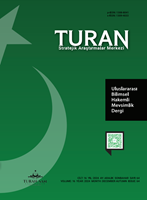ÇAĞATAY TÜRKÇESİ DÖNEMİ METİNLERİNDE SES DÜŞMELERİ
VOWEL AND CONSONANT LOSSES IN CHAGATAI TURKISH TEXTS
Author(s): Adnan KokSubject(s): Morphology, Lexis, Sociolinguistics, Turkic languages
Published by: Sage Yayınları
Keywords: Chagatai Turkish; Vowel Loss; Consonant Loss;
Summary/Abstract: Chagatai Turkish is an important written language that was used in Central Asia between the 15th and 20th centuries and is one of the Turkic languages. This language developed during the Timurid Empire period and was utilized as a literary language by prominent poets, such as Ali Shir Nevai. Chagatai Turkish evolved from Karakhanid Turkish and later transformed into Modern Uzbek. It was written using the Arabic script and was strongly influenced by Persian and Arabic. Poets and writers of the time combined both vernacular speech and the nuances of literary language to compose their works in this medium. Chagatai Turkish significantly contributed to the development of the language and fostered the emergence of important poets such as Ali Shir Nevai, Hüseyin Baykara, Mevlana Sekkaki, and Lutfî. In this context, key works from the period have been analyzed to identify instances of phonetic reductions. Within this framework, Chagatai Turkish texts have been examined, and examples of phonetic reductions are presented, categorized under two main headings: vowel and consonant reductions. Furthermore, reductions occurring in the initial, medial, and final positions of words have been identified, with an analysis of the frequency of vowel and consonant drops.
Journal: TURAN-SAM
- Issue Year: 16/2024
- Issue No: 64
- Page Range: 300-304
- Page Count: 5
- Language: Turkish

